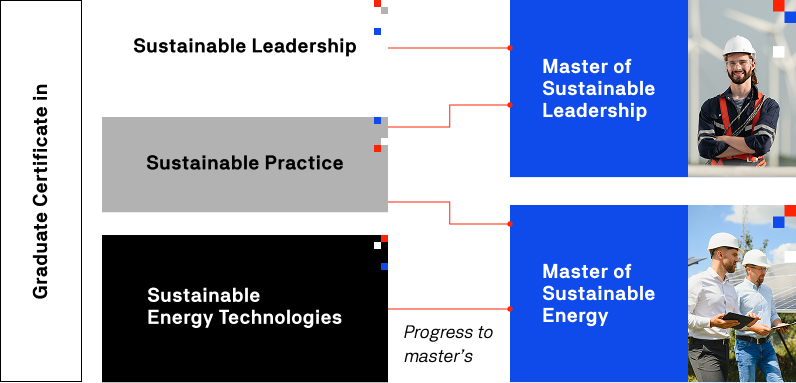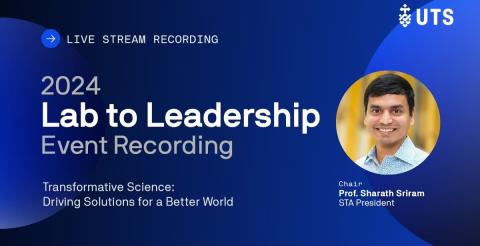Why study the Graduate Certificate in Sustainable Leadership with UTS Online?
Top 100 University Globally2
Top 20 global university for advancing sustainable development1
Become a catalyst for change and pave the way for a more sustainable future
Data-driven leadership for ethical, accurate and reliable decision-making
1Times Higher Education Impact Ranking. 2QS World University Rankings, 2026.
Lead the charge towards a better tomorrow
Our journey towards a sustainable tomorrow is gaining momentum. We have science, data, technology and consumer demand.
Now, more than ever, we need visionary leaders who can guide us there; strategic trailblazers who can inspire and motivate others to join in the quest for sustainable transformation and empower others to act through policy and best practices.
Develop your leadership skills to drive change towards a sustainable future with the UTS Online Graduate Certificate in Sustainable Leadership, and not only future-proof your career but also contribute to the planet's well-being.
Who is this course for?
The Graduate Certificate in Sustainable Leadership is designed for professionals from any industry or background who want to build practical skills to drive sustainability initiatives within their workplace, organisation or community. Whether you’re just starting your sustainability journey or looking to formalise your knowledge, this course equips you with the tools to create meaningful environmental and social impact.
If you're ready to apply sustainability thinking to real-world challenges, this course provides the foundational knowledge and skills to make a lasting difference in any field.
This course is suited to professionals with relevant qualifications and experience, such as:
- Professionals from any sector seeking to integrate sustainability into daily operations and long-term strategy.
- Business leaders and managers looking to build sustainable practices into organisational culture and decision-making.
- Consultants and advisors wanting to strengthen their understanding of sustainability principles and frameworks.
- Professionals in government or community roles working to deliver projects with positive environmental and social outcomes.
- Anyone passionate about contributing to a more sustainable future through practical action and informed leadership.
See entry requirements under course information for more eligibility information.
What you will study
The UTS Online Graduate Certificate in Sustainable Leadership comprises four online subjects (24 credit points [CP] in total).
Complete all of the following subjects:
- Shaping Policies for the Future
- Sustainability Practices in Industry
- Science of Climate Change for Leaders
- Science and Big Data
Note: Most UTS Online subjects are valued at 6 credit points each. For detailed subject descriptions and further information, please download a course guide.
Flexible course options
The Graduate Certificate in Sustainable Leadership comprises 4 online subjects (24 credit points [CP] in total).
Students who complete the Graduate Certificate in Sustainable Leadership may qualify to advance to the Master of Sustainable Leadership, requiring only 5 additional subjects to complete the master's degree.
Graduate Certificate
4 Subjects | 8 months (minimum)
Or continue studying
Master's
+5 Subjects | 24 months
Graduate with a Master's degree
One of our Student Enrolment Advisors can assist you with more information, including alternative pathways.
Study pathways
The Faculty of Science offers 3 online Graduate Certificate courses to support your career in sustainability.
The Graduate Certificate in Sustainable Leadership leads to the Master of Sustainable Leadership, the Graduate Certificate in Sustainable Energy Technologies leads to the Master of Sustainable Energy, and the Graduate Certificate in Sustainable Practice provides a flexible pathway into either master's degree.
This allows you to tailor your studies to align with your career goals and develop specialist skills in the areas of sustainability that matter most to you.
Learning outcomes
Design and implement policies for a sustainable future
Develop the expertise to craft and evaluate policies that drive sustainability. Apply strategic thinking to influence change and create impactful, long-term environmental and social solutions.
Drive industry transformation through sustainable practices
Learn to integrate sustainability into business and industry operations. Become a catalyst for innovation by implementing practical solutions that promote long-term environmental and economic resilience.
Harness data and science for informed decision-making
Leverage big data, analytics and scientific research to inform sustainability strategies. Gain confidence in evaluating the impact of public policy on health, the environment and social well-being.
Lead with confidence in the sustainability sector
Build leadership capabilities that empower you to drive meaningful change. Develop the skills to communicate, collaborate and influence key stakeholders in global sustainability efforts.
Course information
Entry requirements
Applicants must have one of the following:
- Completed Australian bachelor's degree or higher qualification, or overseas equivalent
OR
- Completed Australian diploma or higher qualification, or overseas equivalent AND a minimum of 2 years full-time, or equivalent part-time, relevant science, industry, or sustainability-related professional work experience#
OR
- A minimum of 3 years full-time, or equivalent part-time, relevant science, industry, or sustainability-related professional work experience#
# Relevant professional work experience may be demonstrated through roles classified under the following OSCA groups: Managers (01), Professionals (02), Technicians and Trades Workers (03), Community and Personal Service Workers (04), Clerical and Administrative Workers (05), and Sales Workers (06).
Supporting documentation to be submitted with the application
For applicants who need to demonstrate professional work experience:
- Curriculum Vitae AND Statement of service in one of the following formats:
- A 'Statement of Service' provided by the employer
- A completed 'UTS statement of service’ signed by the employer
- A statutory declaration confirming professional work experience (Australian residents only)
- An official letter from the applicant’s accountant or solicitor, on company letterhead, confirming the applicant’s professional work experience or engagement with the business, duration of operations, and nature of the business
- A business certificate of registration in original language and English (e.g. provision of ASIC documentation or ABN or similar documentation for Australian Businesses)
Eligibility for admission does not guarantee an offer of a place.
Want to check your eligibility?
Not only do we have the right tools and support teams to help you – we have people who care about your success.
Career Outcomes
The UTS Online Graduate Certificate in Sustainable Leadership equips professionals with the skills to lead sustainability initiatives and drive organisational change. This course is designed for those looking to integrate ethical leadership with sustainable practices.
Upon completion, graduates can explore roles such as:
- Team Leader (Sustainability Projects)
- Corporate Social Responsibility (CSR) Coordinator
- Sustainability Advisor
- Organisational Change Support Officer
$93,000
Average salary
Graduates of the Graduate Certificate in Sustainable Leadership can expect an average annual salary of $93,000, based on roles such as Team Leader (Sustainability Projects), Corporate Social Responsibility (CSR) Coordinator and Sustainability Advisor.
(Talent.com)
An expanding job market
The sustainability sector in Australia is expanding, with over 3,200 job listings related to sustainability roles, indicating a robust demand for professionals equipped with sustainable leadership skills.
(Indeed Australia)
56%
of CEOs prioritise sustainability
A global survey found that 56% of CEOs consider sustainability a key factor in driving business growth, highlighting the demand for leaders with expertise in sustainable practices.
(KPMG)
Upcoming intakes
UTS Online courses have 6 intakes per year. The diagram below shows all upcoming intakes. Our next intake is highlighted below
-
Jan
2026 -
Mar
2026 -
May
2026 -
Jul
2026 -
Aug
2026 -
Oct
2026
Meet our Course Director
"Our graduates will become leaders who define the future and shape policies for the benefit of all. They will develop advanced capabilities to lead with confidence in government, the community and industry."
Dr Parvez Mahmud
Senior Lecturer, School of Mathematical and Physical Sciences;
Program Director, Master of Sustainable Energy and Master of Sustainable Leadership
Download a course guide
Download a course guide to explore detailed subject descriptions, entry requirements, pathway options and fee information.
Frequently asked questions
The Graduate Certificate in Sustainable Leadership equips you with the operational knowledge and skills to drive positive change towards a sustainable future. You'll develop competencies in crafting sustainable policies, implementing sustainable practices in your industry and leading with scientific insights. This foundation prepares you for roles that require strategic navigation of sustainability challenges and the ability to influence policy and best practices within various sectors.
No, a background in sustainability is not required to enrol in the Graduate Certificate in Sustainable Leadership. This program is designed for professionals from diverse industries who are eager to develop foundational knowledge to make informed sustainability decisions and contribute to creating a sustainable future through learned skills.
Yes, upon successful completion of the Graduate Certificate in Sustainable Leadership, you have the opportunity to enrol in the Master of Sustainable Leadership, allowing for further specialisation and advanced expertise in the field.
At UTS Online, your success is our priority, and that doesn't change when you study remotely. We're committed to providing you with a comprehensive range of student support services, guiding you from enrolment right through to graduation.
As a UTS student, you'll enjoy access to an array of support services, including:
-
Your own dedicated Student Success Advisor, available to answer any course-related questions you may have to keep you on track
-
UTS Career Hub for work experience and networking opportunities
-
Assignment writing and academic support from teachers & lecturers
-
Public speaking and peer learning support
-
Confidential medical and mental health services.
Connect with us to learn more about how we support your success while studying for a Graduate Certificate in Sustainable Leadership at UTS Online.
Assignments in our subjects are authentic, relevant and often grounded in your personal clinical context. They vary according to the subject and include, but are not limited to clinical reports, posters, online quizzes and vivas (oral assessment), podcasts, recorded presentations, education tools, proposals, protocols and professional portfolios. You will not be required to complete exams or group assignments to graduate the Graduate Certificate in Sustainable Leadership.
When studying the Graduate Certificate in Sustainable Leadership, your online study experience includes:
-
Resources for sustainable practices and organisational change
-
Flexible learning schedules for busy professionals
-
Collaborative tools for engaging with peers
Here’s a video example showcasing key features of our online learning platform, including tools designed to enhance your study experience.
For practical tips on balancing your studies with work and life, click here to learn how to achieve your goals. Remember, our team is just an email or call away to support you every step of the way.















